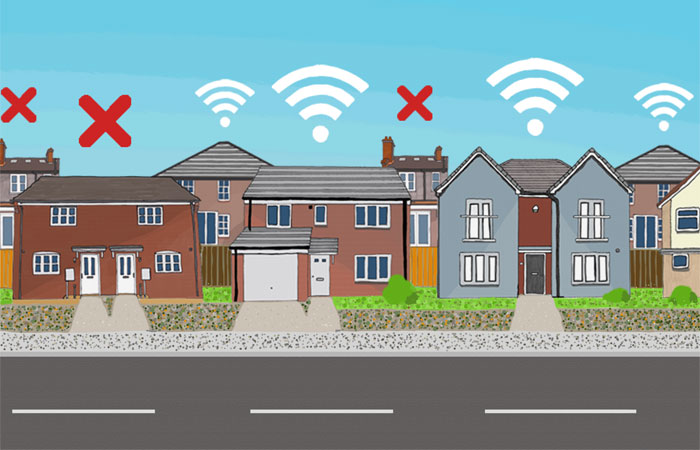Swallowing Pride and Feeling Locked Out

Artwork above by Dan Healey.
In the United Kingdom, ATD has been working with the APLE Collective to document the “digital divide”. Families in poverty have always had trouble accessing the Internet. Now, during the Covid-19 pandemic, things are worse. The article below is adapted from a longer blog post found here.
The Disconnect: Swallowing Pride and Feeling Locked Out
Accessing the Internet has always been an uphill battle for people in poverty. Now that social distancing measures have pulled the shutters down on public places that offered free access, that struggle is even harder.
“Before the lockdown”, explains Gloria in Scotland, “my daughter stayed after school every day to use the Internet there for her homework. Now, without wifi of our own, I had to swallow my pride to ask our neighbour if we could piggyback onto his network from our flat.”
Although some schools have managed to give tablets to students who need them, Gloria’s daughter, age 15, received nothing. Before making this arrangement with her neighbour, Gloria said: “I had to buy a pay-as-you-go bundle on my phone because otherwise she could not do her homework.”
Gloria herself is studying for a health care qualification. Before the pandemic, she went to the library to do her coursework.
- “Even then it was difficult”, she says. “For assessments, we need to print things, so I would pay 10p for each page. Now that I’m using my neighbour’s wifi, I took two assessments online at home. But I was really scared of getting cut off in the middle. I had to plead with him not to use the wifi for anything that would interrupt my network during the exams.”
Financial exclusion and digital exclusion go hand in hand
People on very low incomes with no access to credit are forced to use outlets and services that are more expensive and less reputable. Before the lockdown, a woman in south London tried to buy a refurbished smartphone. Because she has no fixed residence, she cannot open a basic bank account and has no bank card. So she used a small shop that would take cash payments. But they sold her a faulty phone with no warranty. This woman could have purchased a cheaper phone at a high street shop. But that shop had a no-cash policy in place. With no smartphone during the lockdown, she is completely cut her off from her support network.
“It’s like being locked out of the world”
The benefits system has been moving steadily on-line and people struggling with access and technology can receive sanctions for a perceived failure to comply. In Feltham, a woman describes the challenge of looking for work to demonstrate that she remains qualified to receive the Job Seekers Allowance, even in the midst of a national lockdown:
- “So I don’t get sanctioned and still get to receive my JSA benefit I have to stay in contact with my job agency. They have asked me to download an app to do a video chat for some sort of training next week. So I have to make sure my Internet allowance is topped up.”
Wifi and smartphones are critical for further education, work, and administrative requirements. But also, as Gloria in Scotland explains, “It’s really significant to have Internet access because everything these days is done electronically. Not having wifi is like being locked out of the world. I used to use wifi on the bus to see the news. At the beginning of the lockdown, I felt locked out because I didn’t know what was going on.”
If only wifi were free…
Vitalis Mbah is a refugee from Cameroon in Manchester and the lead person on destitution for RAPAR (Refugee and Asylum Participatory Action Research). “Given the fact that I do not have wifi at home”, he explains, “even before the lockdown I was unable to download important documents while researching with my phone.” Sometimes he had to wait to complete work in the RAPAR office where he could access the Internet.
“At the moment the lockdown has worsened the whole situation”, Vitalis continues, “because I cannot go out to where I can connect to the network. I can only send e-mails if I beg to be connected to someone’s wifi.”
Vitalis can imagine many ways that free wifi would transform his life. “Getting in contact with my lawyer, either through e-mail or Whatsapp would be a plus, because I am unable to get to her at this moment. “[Having wifi] would enable me to do online research on anything that I fancy, learning new English words and meanings, or learning about creating logos and designs. The Internet enhances self-studies and research and I absolutely need to be part of this.”
What can be done to bridge the digital divide?
We ask the Government to find practical solutions to cross the digital divide and introduce free wifi for vulnerable low-income groups. We ask that this work includes and involves the voices of people with lived experience, in order that their response is both timely and effective in low-income communities.

